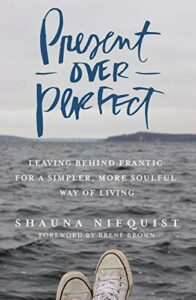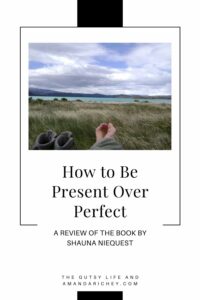A Review of the Book Present Over Perfect by Shauna Niequest
This book changed me. I read it at the start of my unraveling and then again at the end. This book, Untamed, and Wintering were the anthems of my unraveling, or possibly my becoming. I was searching for a way to put into words the experiences I was having and the reckoning I was undergoing, and then I found this book. It echoes so closely my own journey that I found myself exclaiming “yes!” and “I know!” and “exactly!” constantly as I read. I highlighted and annotated the heck out of this book as well. Every time I pick it up, I gain something new as I transition into a more present, less perfect way of life.

Shauna Niequest is a food writer and Christian author, but don’t let that deter you from reading this book! Yes, her previous work may seem unrelated, and yes, she talks about God in the book, but she brings you along her honest, open, and deeply personal journey as her companion and friend, gently encouraging you to open up and see the truth of your own life as she did with hers.
The Catalyst
She begins with the sea-change, or a passage in her life. This sea-change was initiated by the realization that she was not who she wanted to be. She realized she was not living a life that aligned with her values. She was too focused on hustling and productivity and was missing out on the connection she craved with her family, and most importantly, with herself.
“This book is an account of my winding, messy journey from exhaustion to peace, from isolation to connection, from hustling and multitasking to sacred presence. And this book is an invitation too – a hand reaching across the pages, inviting you into that same journey, because it has been the greatest, most challenging, most rewarding sea-change of my adult life […] the hope is that this book will be a thousand invitations, springing up from every page, calling you to leave behind the heavy weight of comparison, competition, and exhaustion, and to recraft a life marked by meaning, connection, and unconditional love.”
The Problem: Hustle. People Pleasing. No Boundaries.
Niequest’s journey taught her that she had been running on overwhelm. She wasn’t taking care of herself because she was too busy taking care of everyone else. She described herself as the responsible one, the care giver, the one people sought out to solve a problem, and she loved it. She had always been the type of person who could take care of everything and do it all, but she realized that she had been too focused on the outside values and measurements of others; career, success, accolades. She was continually giving her best energy to things outside herself and saying yes to everything. She realized that she had no boundaries, she didn’t know how to say no, or how to rest. Even when “resting” she was working through a to do list of some sort.
Niequest realized that her lifestyle was like that of an addict; addicted to the praise, the hustle, the productivity. She was using business and hustle as a coping mechanism; a way to mask and avoid all the feelings of vulnerability and questions of self-worth. Instead, she had bought into the perfectionist fantasy that if she just pushed enough and achieved enough then she would feel happy and worthy.
Sound familiar?
I think this is something that many of us women – mothers especially – can relate to. We have been socialized in our country to be givers, to put others’ needs first, to glorify business. The trope for moms in our society is busy/crazy/overwhelmed, and we’re supposed to accept this is the way it has to be. Her fellow mom friends say, “But what are you going to do?” as if it is an inevitability.
What her journey of Present Over Perfect helped her realize was that ‘YOU’ need to do something. It is not out of your control. You can stop filling your schedules and saying yes to everything. You can change the narrative. You can slow down and be the person we truly want to be so others can learn a better way.
The Answer: Stop. Rest. Be Present.
The word that changed everything for Shauna Niequest was “no.” She realized that we are always saying no to something, and for her, it was usually her needs, her health, her happiness. She realized that she had to say no to some people, activities, and opportunities, so she could say yes to herself.
She came to the conclusion that disappointing people can be hard, but so is living your life based on other peoples’ standards. You will always disappoint someone, but do you want it to be you and your family who end up disappointed? Or other people? She made the decision to never let the ones she disappoints be her family or herself.
“No” gave her the chance to slowdown, declutter, and actually see her life for what it was, then take steps to keep only the things that mattered to her. She learned that “no” was her word only for a season. She had to stop and look around, throw out what wasn’t working for her, get real about what she truly wanted in life, then slowly rebuild her life to, as she puts it, be “the right size and dimension and weight.”
She draws an analogy with the lake. At the lake she is calm and peaceful. She and her family follow the natural rhythms of the weather and the sun. They have fewer things, fewer responsibilities, fewer activities, they take in every moment, living simply, slowly, presently.

How Can You Learn to be Present Over Perfect?
Define Your Core Values
To do this, you need to be super clear on your core values and what you want in your life. Use those values to determine whether something – a job opportunity, a social event, an object – fits in with your life and your values, then choose to say yes or no.
(click here for more on how to define core values)
Define and Hold Your Boundaries
You will always disappoint someone, but it doesn’t have to be yourself. This is called holding boundaries. It’s about knowing your limits and being honest with yourself and others about what you want and can handle. This allows you to be generous instead of resentful towards others, because you have integrity with yourself.
When you start to hear yourself saying you should do something, that is your warning sign. So many of us spend so much time focused on what we should do, think, or feel, that we don’t listen to how we actually feel.
Slow Down
Stop hustling. Stop filling your schedule. Slow way down and follow the natural rhythms of the days and seasons. Make space for yourself to be still and present. Make space for yourself to feel all of your emotions. Spend time in silence. It will serve as your anchor and your sacred dwelling place; where you’ll hear your own voice and learn to honor it. Silence is where you’ll discover your core values and how to live a life based on them; a more present and less perfect life.
Conclusion:
I think we all have an opportunity right now to obtain some of the clarity that Shauna Niequest talks about in her book. The pandemic has forced us to slow down and stop. It has forced us to face the reality of our lives and whether the life we are living matches the life we envisioned for ourselves. This collective slowing down, and the devastation that comes with the loss of life, normalcy, health, social circles, etc., can give us similar perspective.
When all the noise, business, and hustle have stopped, you can examine your life and identify the extraneous stuff, both physical and emotional, that you can let go of. Then you can do what Niequest did; rebuild your life to be just the right “size and dimension and weight” for you.


